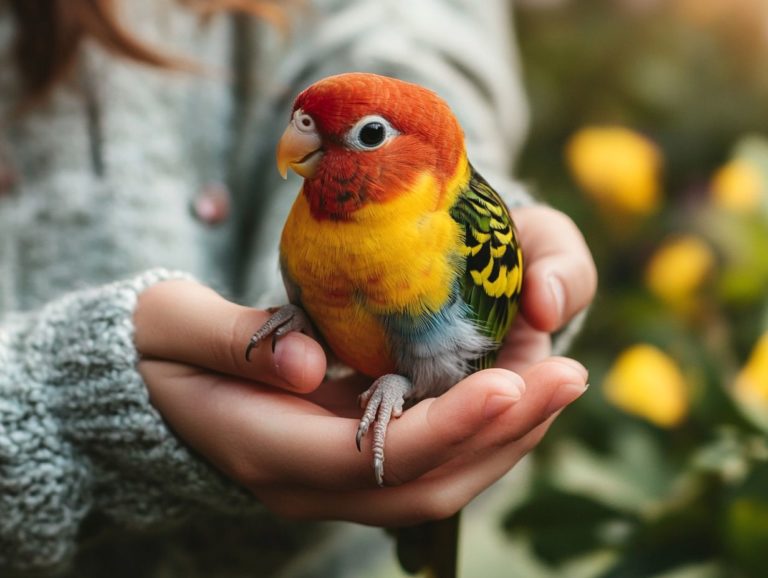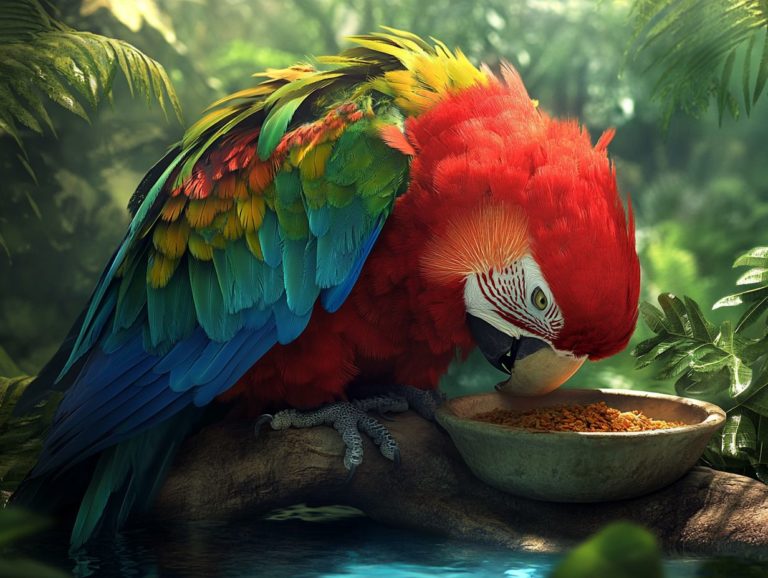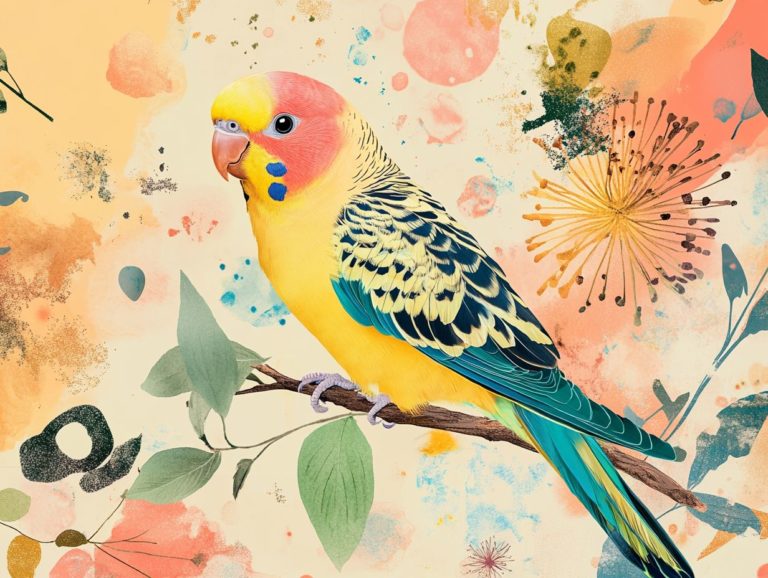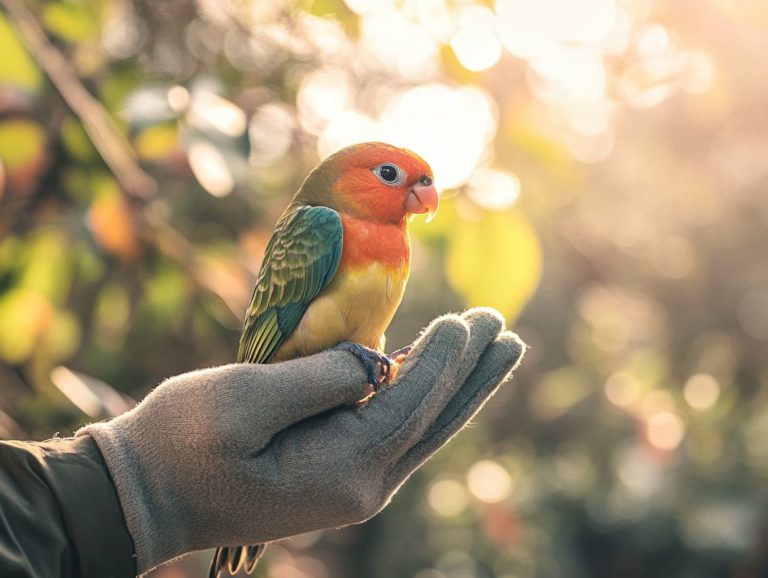What Should I Do If My Bird Bites?
Birds can be delightful companions, yet their playful nature occasionally leads to biting behavior that can leave you puzzled and concerned. Understanding the reasons why birds bite is essential for having a good relationship with your feathered friend.
This article will unlock the secrets of why birds bite. You will learn effective training techniques, recognize when it might be time to seek professional assistance, and discover proactive tips for preventing future incidents.
Contents
- Key Takeaways:
- Understanding Bird Biting Behavior
- How to Handle a Bird Bite
- Preventing Bird Bites
- Training Your Bird to Stop Biting
- Seeking Professional Help
- Frequently Asked Questions
- What should I do if my bird bites and how can I prevent future incidents?
- Why do birds bite, and what are the underlying factors?
- How can I prevent my bird from biting?
- What should I do if my bird bites me out of aggression?
- Can I punish my bird for biting?
- Is it normal for my bird to bite?
- Are there signs that my bird might bite?
Key Takeaways:
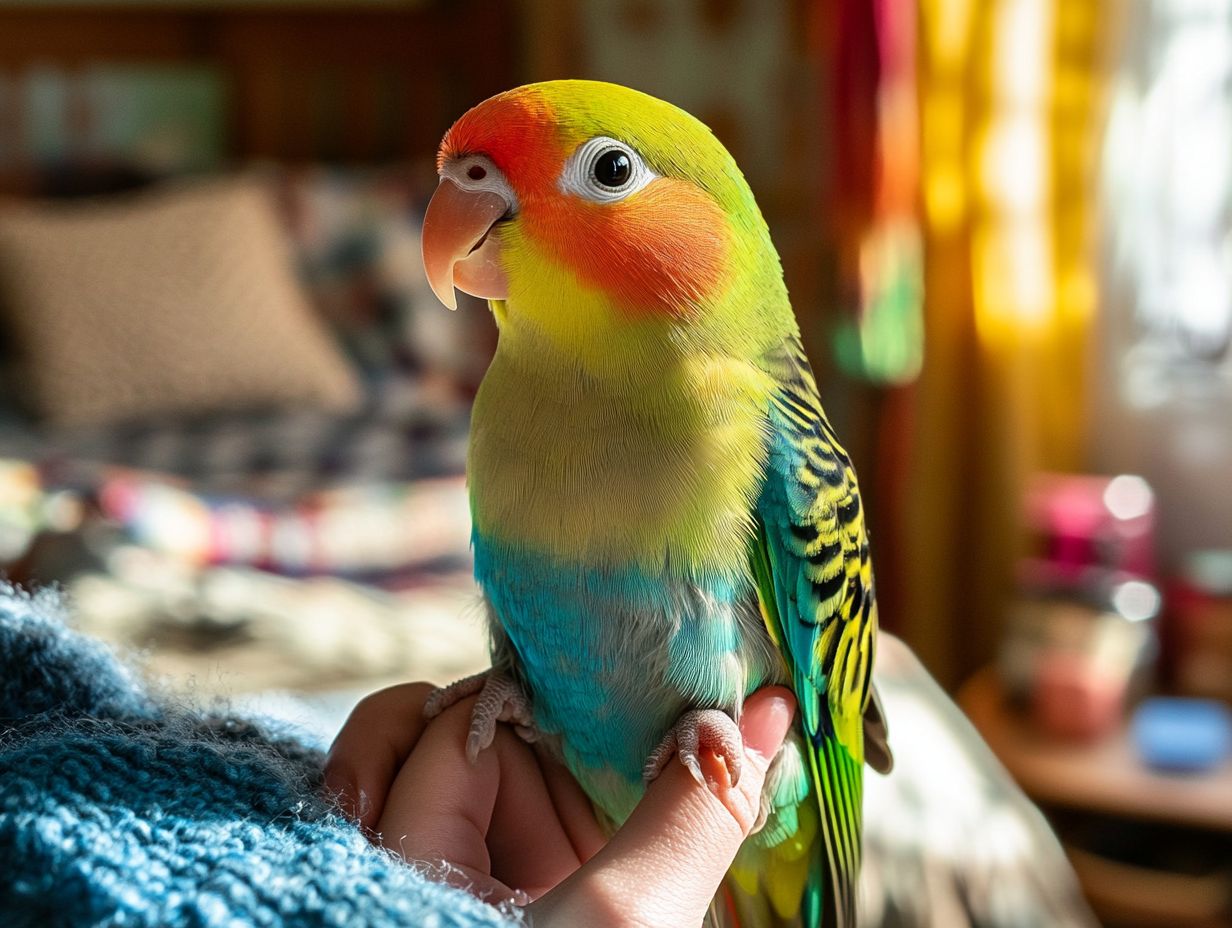
- Be patient and understanding when your bird bites. It is natural behavior and may occur due to hormonal changes or stress.
- Immediately clean and attend to a bird bite by washing the area with soap and water and applying antiseptic cream. Ensure you monitor the bird’s emotional state during the process.
- To prevent bird bites, provide a stimulating and safe environment, focus on rewarding good behavior, and avoid situations that may trigger biting.
- Consistent and rewarding training techniques, such as clicker training (which uses a sound to reward your bird for good behavior), can help train your bird to stop biting.
- Seek professional help from a bird behavior specialist if you cannot manage your bird’s biting behavior, especially if there are signs of aggression or emotional distress.
Understanding Bird Biting Behavior
Understanding bird biting behavior is vital for any pet owner, especially if you have parrots, cockatoos, or macaws. These birds often use biting as a way to communicate emotions like frustration, aggression, and even excitement.
By recognizing the reasons behind their biting, you can enhance your bond with your feathered friend and lead to a more harmonious living situation. Factors such as hormonal changes, stress levels, and the bird’s emotional state play a significant role in this behavior. This makes it essential to carefully observe and interpret their body language and signals.
Reasons for Biting
Birds, such as parrots, cockatoos, and macaws, may bite for various reasons, including stress, frustration, or a desire for attention. Understanding these motivations empowers you to address and mitigate biting behavior effectively through careful observation and interaction.
For example, stress can emerge from sudden environmental changes like introducing a new pet or relocating which may trigger an instinctive response, such as biting. If a bird feels threatened in its territory, dominance or territoriality may lead to nipping.
Another critical factor is boredom. Without sufficient mental and physical stimulation, birds can display negative behaviors, including biting. It’s essential to engage these intelligent creatures with interactive toys, socialization, and regular communication to enrich their environment and avoid frustration.
By recognizing early signs of frustration such as squawking or pacing you can intervene promptly. This fosters a healthier relationship and significantly reduces the likelihood of biting incidents.
How to Handle a Bird Bite
Handling a bird bite requires a composed and intentional response to safeguard both the bird and yourself. Above all, it s crucial to maintain your calm. Reacting with fear can amplify the bird s stress and escalate aggressive behavior, leading to a negative experience for both of you.
By recognizing the bird’s emotional state and fostering trust through positive interactions, you can significantly diminish the likelihood of future biting incidents, improving your overall relationship with your pet.
Immediate Steps to Take
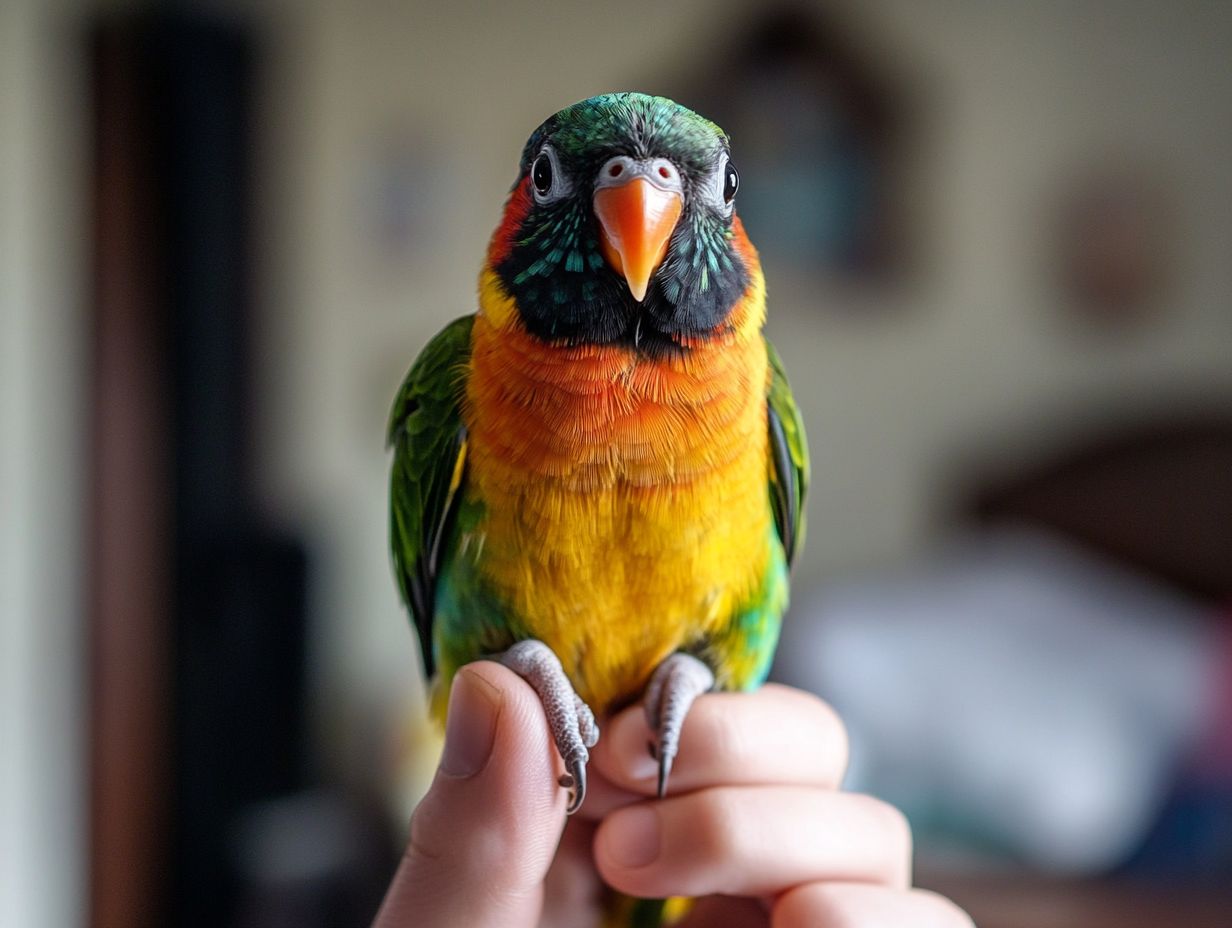
Immediately after a bird bite, act quickly to assess the situation with a calm mindset. Focus on the safety of both the bird and yourself. Avoid sudden movements that might startle the bird; staying composed can help prevent further aggression and lead to better interactions.
Gently remove the bird from its stressful environment. Place it in a quiet, dimly lit area to help it feel secure. Check for any signs of injury on both the bird and yourself, as bites can occasionally lead to unexpected complications.
While assessing the situation, speak softly to reassure the bird. A soothing tone can help alleviate its anxiety. Give the bird time to calm down and understand its emotional state before attempting further interaction. This approach fosters safety and plays a significant role in rebuilding trust.
Preventing Bird Bites
Preventing bird bites requires a thoughtful approach. Create a nurturing environment that caters to both the emotional and physical needs of your feathered friend. Ensure it has plenty of toys to play with to reduce boredom.
Offer a variety of toys to stave off boredom and engage in consistent interactions. Observe for any signs of stress or frustration that might trigger biting behavior, allowing you to respond to their cues effectively.
Prioritizing these elements helps foster a harmonious relationship and minimizes the risk of unwanted nips. This paves the way for an enjoyable pet ownership experience.
Tips for Avoiding Biting Situations
To sidestep biting incidents, establish a routine that blends play, attention, and positive reinforcement. Engaging your pet in interactive activities alleviates boredom and strengthens your bond.
Introduce toys that stimulate their mental agility, creating a space where they can play and explore. By implementing a consistent play schedule, your bird will learn when to expect fun interactions, fostering a sense of security.
Embrace positive reinforcement reward calm behavior or gentle interactions to encourage desirable actions and curb biting tendencies. By nurturing an engaging environment and predictable routines, you enhance their overall well-being.
Training Your Bird to Stop Biting
Training your bird to stop biting is a game-changer for you and your feathered friend! It elevates behavior and fosters trust and better communication.
Using techniques such as positive reinforcement, a reward system, and clicker training which involves using a small device that makes a sound to reward your bird for good behavior you can greatly enhance your bird’s conduct.
Effective Techniques and Strategies
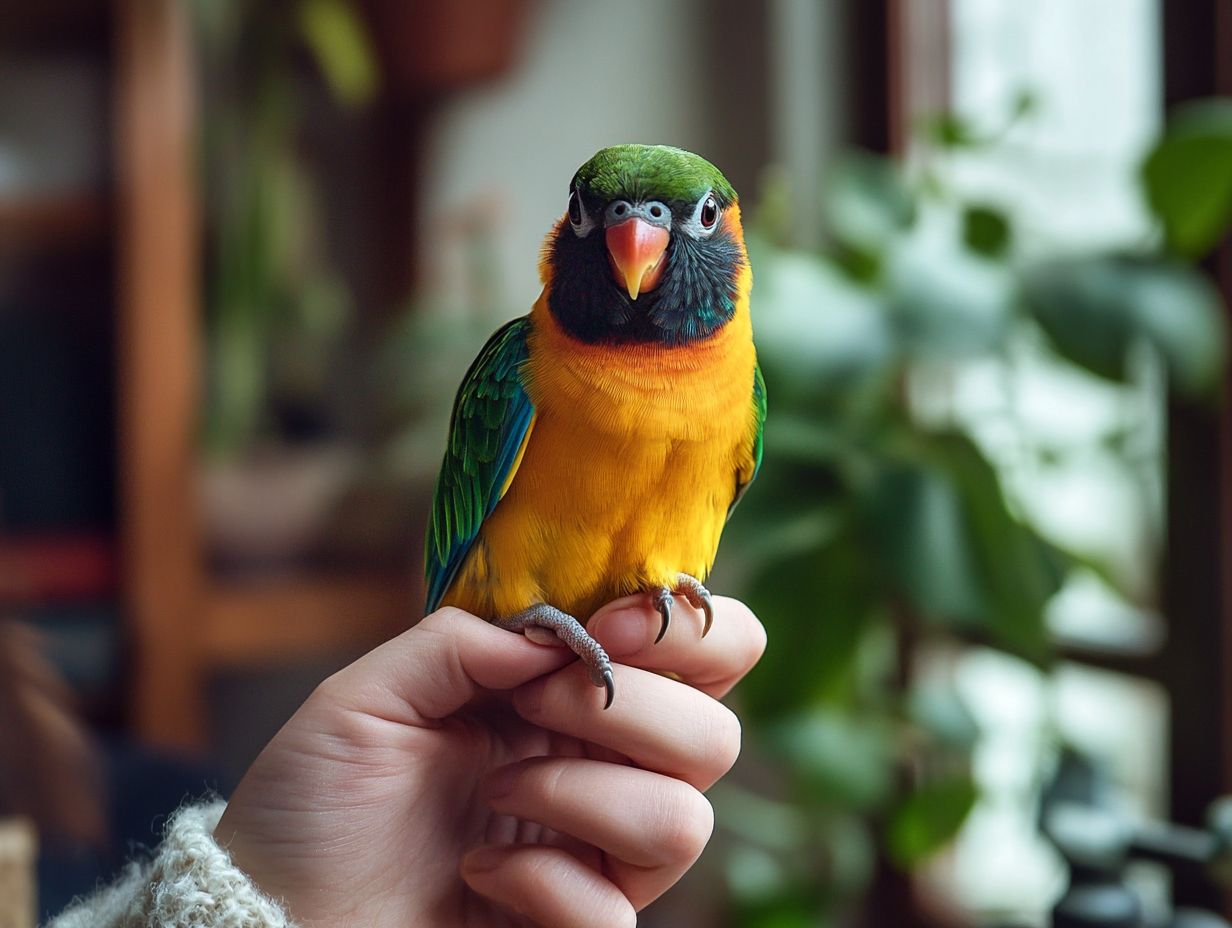
Effective techniques for training your bird to stop biting involve recognizing and responding to their signals and cues while using positive reinforcement methods. Birds are intelligent, and with consistent training, you can enhance their behavior and reduce biting incidents.
Methods like clicker training help your bird associate a sound with desired behaviors. Gradually shape behaviors through small, achievable steps to encourage your feathered friend to adapt their actions over time.
Incorporating treats as rewards can elevate engagement and transform training sessions into enjoyable experiences for both of you. By understanding behavior modification, you create a harmonious environment, nurturing trust and reducing aggression.
Seeking Professional Help
When faced with persistent biting behavior in your bird, enlisting the expertise of a professional who understands bird behavior can serve as an effective remedy. These professionals offer personalized guidance and strategies designed to tackle aggression while improving your bird’s emotional well-being and overall behavioral issues.
This approach addresses the immediate issue while deepening your bond with your feathered companion.
When to Consult a Bird Behavior Specialist
Consulting a bird behavior specialist is wise when biting incidents become more frequent, raising concerns about your bird’s emotional well-being and your own safety.
Early intervention can be a game-changer, preventing further behavioral issues and ensuring a healthier environment for both you and your feathered companion.
When aggression shows up in the form of lunging or nipping during interactions, seeking professional guidance is essential. Similarly, stress-related behaviors, like feather plucking or excessive vocalization, signal that something isn t quite right. These behaviors often stem from anxiety, fear, or less-than-ideal living conditions.
If you find that traditional training methods aren t yielding results and your bird is showing signs of frustration or confusion, a specialist can offer tailored strategies to enhance communication and understanding between you both.
Addressing these behaviors not only improves your bird s well-being but also creates a more harmonious living space, ensuring that both you and your pet flourish together.
Frequently Asked Questions
What should I do if my bird bites and how can I prevent future incidents?
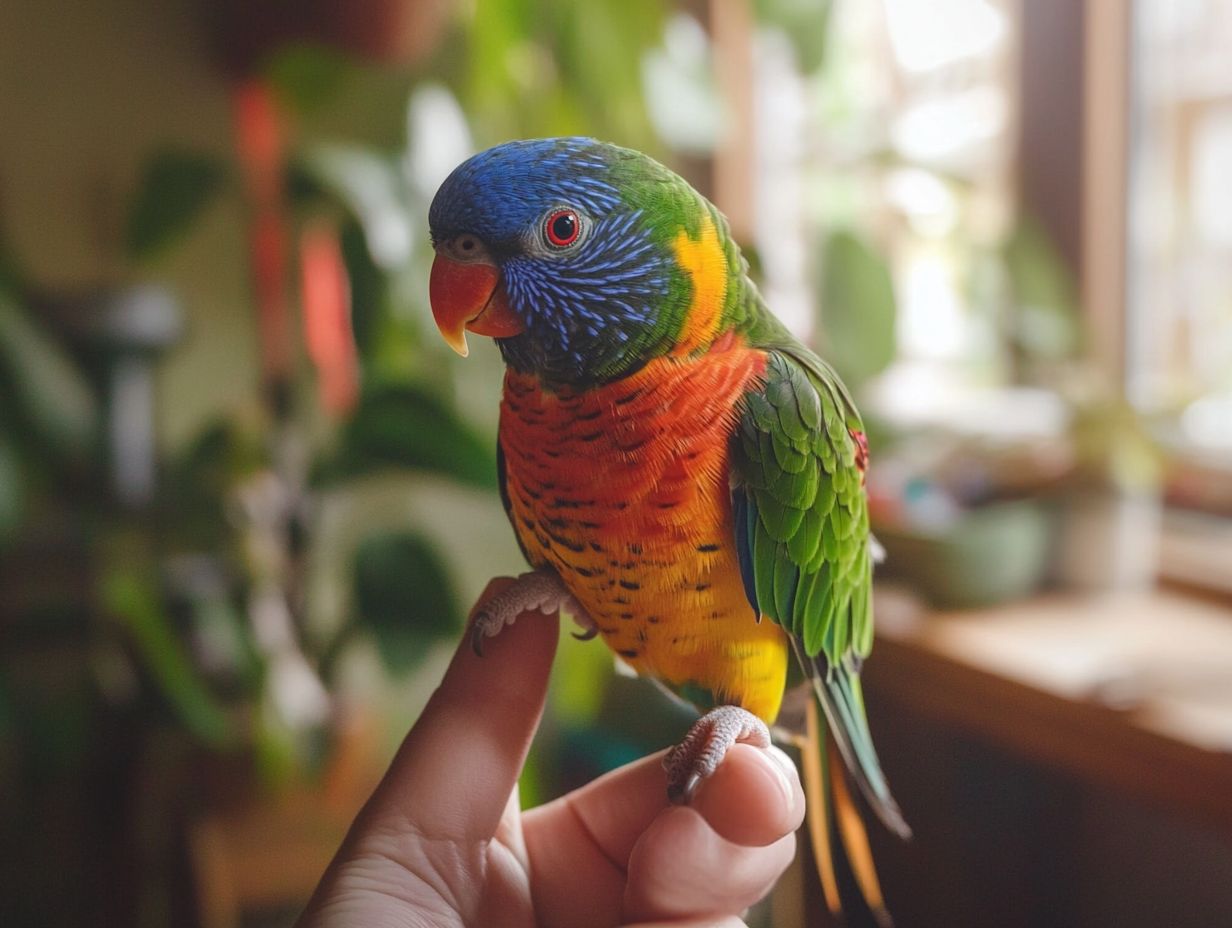
If your bird bites you, the first thing you should do is remain calm. Do not react with fear or anger, as this may only escalate the situation and lead to further biting incidents. If you find your bird is often upset, consider exploring what to do if my bird is screaming for additional insights on managing their behavior.
Why do birds bite, and what are the underlying factors?
Birds may bite for a variety of reasons, such as feeling threatened, protecting their territory, or attempting to communicate. It is important to understand the underlying cause of the biting behavior, including factors like stress and hormonal changes, in order to address it.
How can I prevent my bird from biting?
To prevent biting, it is crucial to establish a trusting and respectful relationship with your bird. This includes proper socialization getting your bird used to being around people training, and understanding of your bird’s body language and signals. Providing engaging toys and activities can also reduce boredom and frustration.
What should I do if my bird bites me out of aggression?
If your bird, such as a cockatoo or macaw, bites you out of aggression, it is important to seek professional help from a bird behaviorist. Aggressive behavior may be a sign of underlying health or environmental issues that need to be addressed, as well as emotional states influenced by fear or anxiety.
Can I punish my bird for biting?
No, punishing your bird for biting is not an effective way to address the behavior. This may only make your bird more fearful or aggressive towards you. Instead, focus on positive reinforcement, like treats, and addressing the root cause of the biting behavior through careful observation of cues and signals.
Is it normal for my bird to bite?
Biting is a natural behavior for birds, but it should not be accepted or encouraged. With proper training and understanding, including clicker training and establishing a reward system, biting can be minimized or eliminated in most cases.
Are there signs that my bird might bite?
It s essential to watch for signs like raised feathers, beak opening, or a tense posture. These cues can indicate that your bird is feeling threatened or uncomfortable.
Contact a bird behavior expert today for tailored guidance!

